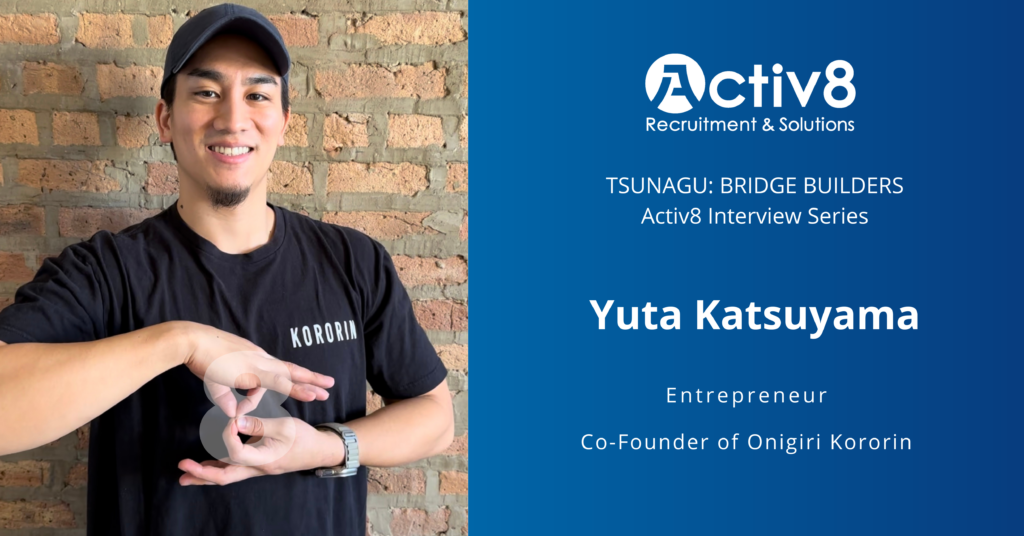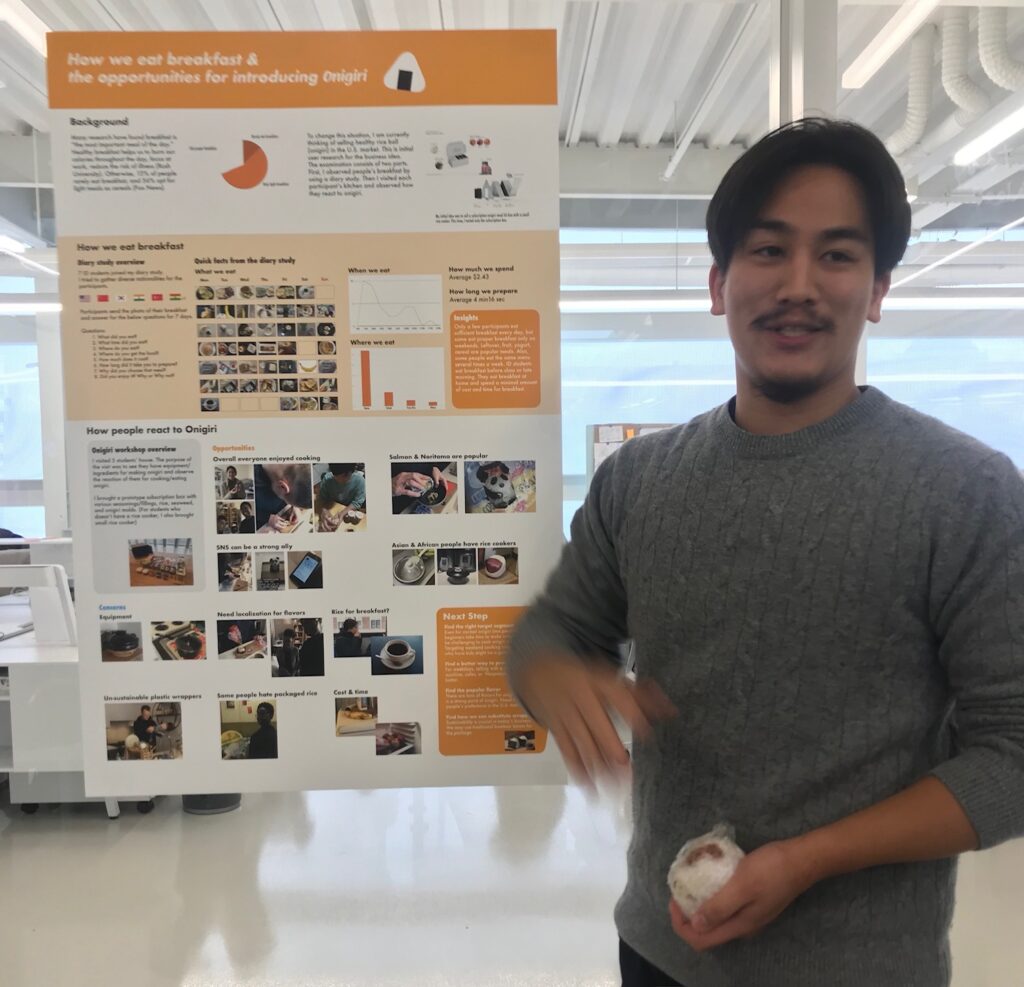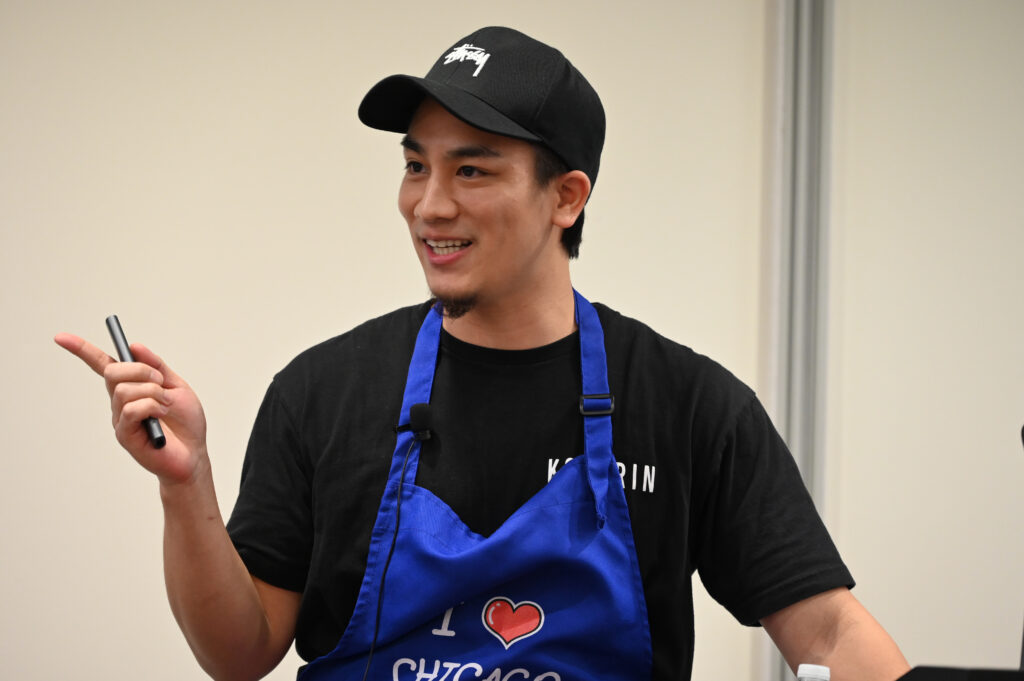TSUNAGU: To Connect: Whether it is connecting employers to job seekers or bringing different cultures together, we at Activ8 value the bridge-builders who make our world a better place every day. Our new series, TSUNAGU, will feature inspirational people who connect North America and Japan through business, education, art, culture and more.
Yuta Katsuyama: Entrepreneur and co-founder of Onigiri Kororin

Yuta Katsuyama is an entrepreneur and co-founder of Onigiri Kororin who wants to popularize onigiri – Japan’s national snack – throughout the United States. After graduating from a university in Tokyo and working several years at a food tech and consulting company, Katsuyama studied business and design at the Illinois Institute of Technology (IIT) in Chicago. While studying day and night, his desire to eat healthy and delicious Japanese onigiri grew, and in the summer of 2020, he began to sell onigiri. We asked him to share his story on how he developed his business from this basic idea to an enterprise with a staff of 12 people in just a few years after beginning in the middle of the COVID-19 pandemic.
From Law School to MBA
Born and raised in Tokyo, Katsuyama enjoyed creative activities such as arts and crafts as a child, and especially loved to show his creations to his family and friends. He studied law at Keio University and after graduation worked for a food tech management consulting firm in Japan, where he had responsibilities for food refrigeration technology and IoT appliances that connected to the internet. Although he took many overseas business trips and gained a lot of meaningful experience, he had a difficult time communicating with non-Japanese because he did not speak English well at the time. Despite this challenge, Katsuyama came to Chicago to the Illinois Institute of Technology in 2018 determined to obtain an MBA from an American university.
Studying Abroad and a New Awakened Interest in Onigiri
Since childhood, Katsuyama has been skilled at making things. When he was a businessman engaged in consulting work, he had an agonizing desire to “create something of my own.” At IIT, he decided to take on a double major in design and business administration because he also had an interest in the impact of design in business.
Onigiri was something that often came to mind when he was working hard at his studies and got a little hungry. In Japan, onigiri were always close at hand, especially when he was working overtime, but in Chicago, he could not find them. Katsuyama had no choice but to eat a sandwich from the convenience store for lunch, but it was never satisfying. He recalled, “I wanted to eat a good onigiri!” Motivated to somehow eat onigiri that he missed, Katsuyama designed a triangular rice cooker shaped like an onigiri for a graduate school project. It was well received by his professors and classmates and led to even more new ideas.

The following year, Katsuyama attended a seminar at the Hatchery, a food-focused entrepreneurship support organization, and was so impressed that he decided to participate in the six-month Sprouts Incubation program. This program provides guidance and support to aspiring entrepreneurs all the way from product concept to marketing. Right around this time, COVID-19 hit the world and Chicago went into lockdown in March 2020. Katsuyama was prevented from engaging in social activities along with everyone else, but the program’s instructors guided him to launch a business selling onigiri with a fellow design student at his graduate school, Cristina Tarriba.
Onigiri Shuttle Kororin is Born
After brainstorming with a few others, Katsuyama and Tarriba decided on shuttle sales, where orders are placed online and onigiri are delivered to a designated location. At 30 years old, Katsuyama created his company, Onigiri Shuttle Kororin. The name comes from a Japanese folk tale, “Omusubi Kororin” (The Rolling Rice-balls), a moral story about a nice old man who drops his onigiri into a hole and discovers a tiny castle filled with joyous, sentient mice. Like the nice old man in the story, Katsuyama wanted to make onigiri that would bring everyone joy. In July 2020, the company began selling onigiri with a wide variety of ingredients, including miso scallions, corn, cheese, salmon, and tofu, all wrapped in bamboo leaves. Word of mouth and social media drove their initial sales, and the response was so positive that after two weeks there was a line at the designated location, and the number of repeat customers increased. Onigiri Shuttle Kororin was off to a good start!

Social Media and the Media’s Effect
After making extensive use of social media to reach their customers, Onigiri Shuttle Kororin caught the attention of the media, winning a rave review from influential Chicago Reader food reporter Mike Sula, who declared in an article headline, “Katsuyama-san is the once and future rice ball king of Chicago.” In October, he was interviewed live from the Hatchery by Ana Belaval, a reporter for WGN TV’s popular morning news show. The following September, Chicago Magazine featured their miso negi onigiri, and in the magazine’s December issue, the onigiri was named one of the 27 most delicious dishes eaten that year. Katsuyama recalled that the impact of all this media was to raise the brand’s profile significantly. The company’s circle expanded quickly, and they began to receive offers to collaborate. They weren’t quite ready for large scale deliveries yet, but Katsuyama decided that they had to move forward.
A Business Model Discovered through Trial and Error
In terms of management, Katsuyama handled operations while his partner, Tarriba, was in charge of sales. Onigiri Shuttle Kororin was going strong, but then winter arrived in Chicago, and the number of people showing up for outdoor food pick-up dropped drastically. The end of the pandemic hurt the business more as restaurants reopened and the number of customers declined. They needed to revamp their business model, and began collaborating with food and beverage manufacturers, restaurants, bars and retail outlets. They even leveraged Uber Eats to sustain their business. “To be honest, the first two years have been hard, but I didn’t give up,” Katsuyama said. “I continued to experiment with events, catering, cooking classes, and other business models. I felt the intense impact of the world’s economic and social conditions on business.”
To grow his business, Katsuyama knew that he needed a stable channel for sales. The solution, based on experience and wisdom, was to wholesale the onigiri to retail stores. They closed Onigiri Shuttle Kororin in March 2022 and started their wholesale business in July of the same year. Co-owner Christina Tarriba’s Mexican American heritage gave her an advantage in the retail industry, which has a large Latino, Spanish-speaking population. Tarriba used her Spanish language and sales skills to quickly increase the number of their customers, and in November, the company officially began wholesale operations as Onigiri Kororin.

“I Want to Spread Onigiri Across the U.S.”
As the business took a new turn and expanded, it became necessary to review business processes and reform their organization. Realizing the limits of what two people can do on their own, Katsuyama now worked hard to build a team. Currently, they employ a total of 12 staff members, including those in the kitchen, delivery, sales, and accounting departments. The company distributes onigiri to about 40 stores, including major chains such as Beatrix Market, Goddess & Grocer, and Fresh Market Place, as well as the University of Chicago. “I want to increase the number of stores to 100 by the end of 2024,” Katsuyama said with a twinkle in his eye.
In urban America, sushi and ramen have become part of the mainstream food culture, but onigiri is still not as well-known. While localizing onigiri to some extent by adapting the ingredients to American tastes and preferences, the company hopes to introduce onigiri made with delicious Japanese rice. “I would like to keep working towards raising awareness of onigiri. There are still many people who don’t know what an onigiri is, and some people think Kororin is an onigiri,” Katsuyama said with a laugh.

Career Advice
“I want to pursue what I love in my life. If I don’t love it, I won’t continue,” added Katsuyama. As a manager, he values learning new things every day and tries to take a leadership role while listening to his team’s opinions. “Japanese people seem to have uniformly clear strengths and weaknesses, but Americans tend to have strong personalities. I strive to make the most of each team member’s individuality,” he said. Katsuyama, who studied law at university in Japan, still reveres the rules, but as a “creator,” he dares to challenge the existing order and continues to create innovative and interesting products.
We look forward to the day when onigiri becomes popular in the United States and look forward to Katsuyama’s continued success.
Related Sites
Onigiri Kororin Official Site
Instagram
Facebook

